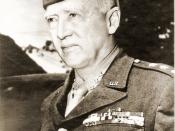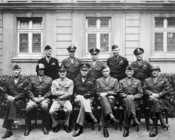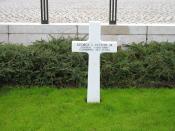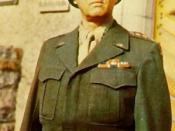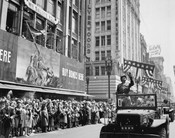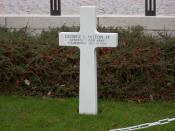George Patton, General in Spurs Each piece of history which has passed by has had its leaders and its heroes, and each has given a personality to the times which they were a part of. One such leader was General George S. Patton. The controversy over his decisions and strategies are everlasting, but Alden Hatch's book, George Patton, General in Spurs, clearly is supportive of the General's personality. With objective details, Hatch provides a full portrayal of the General and his affect through World War II while supplying details of his personal life and values.
Alden Hatch's work deals primarily with biographies and histories. He has written many biographies on leaders such as Franklin D. Roosevelt, Martin Luther King Jr., Lord Mayor Robert Biscoe of Dublin, Glenn H. Curtiss, as well as families such as the Byrds of Virginia. He has researched an enormous amount of materials like diaries, notebooks, and photos.
Hundreds of short writings and magazine articles mainly about history's important people have been published by Alden as well as quotations translated from tapes and correspondence.
The research done on General George S. Patton was primarily through first-hand information. He talked with Mrs. George S. Patton Jr., her daughter, Mrs. John C. Waters, Dwight D. Eisenhower and his wife, Miss Anita Patton, and several other Colonels familiar with Patton and his work. Hatch states that he drew much information from several books on the general also.
This book was a narrative biography of General George S. Patton's life, including his military career and virtues. The book discusses his primal love and knowledge of historical battles and desire to be a general. He was born in 1885 and died ironically in 1945, in car accident soon after returning from World War II. The book covers his entire life, each battle he led as well as home life and the historical facts surrounding the subjects discussed. Historical battles are included detailing Patton's reactions and the effects of each battle. The author especially concentrates on Patton's views and personality, coming across as supportive and inspired by his loyalty and magnificence.
Alden Hatch, in his prologue, says, "The career of General George S. Patton, Jr., was so full of color and flash, yet his character was so genuine, inspired as it was by those twin virtues, courage and integrity, that living with his memory in the intimacy of author and subject was a time of pure delight." Each word in this book aids in the portrayal of General George Patton as a superb man and military leader. The author aims to persuade the reader into a positive viewpoint of the General's ideals and tactics.
The author begins with "Georgie's" childhood, concentrating on his family relations and ethics. The family history brings in a point of patriotism and devotion in leadership. Georgie's adolescent years prove his dedicated character as Hatch describes his persistence even after surprisingly being held back one year. His early love for Beatrice Banning Ayer shows his soft side, one which we don't think of usually when remembering General Patton. Through they had plans of marrying, Beatrice and Patton waited eight years to marry, while he studied at West Point. Explanation for his unpopularity through his academy years include both his cockiness and are refuted at the end of the chapter by the author's description of his triumphant graduation from the academy where he was respectfully saluted by his cadets.
The author concentrates also on General George S. Patton's intelligence and successes in battles. Unlike most military leaders, he used less strategy and relied more on what he called a "sixth sense". Patton had sense of what needed to be done, where, ands how, and could figure all this out in an instant. This sense and his knowledge of history helped him to make dazzling victories such as Battle of Cambrai, where he led the first victory using tanks. Patton helped to spawn a new military era through the success of the tanks, and with only eleven day's study of the unfamiliar tanks.
Hatch tells of a battle where Patton was shot in the leg and dragged into a trench hole where he continued to command. "Between frequent fainting spells, as blood poured from his wound, Patton organized a line of defense, throwing out patrols to guard his precious tanks," Hatch writes. This sense exposes Patton's dedication, making him seem one of the most patriotic of military leaders.
One very important character of General George Patton was his belief that armies should be led. He would never follow his men, but would lead them to battle to encourage them and revive their confidence. In one bottle, he slowly walked down a beach through bullets be seen by his men, in a state of crisis. His tactic worked every time and here the troops stopped dividing into foxholes and started fighting. The author did an excellent job in persuading me of Patton's courage through many anecdotes where he would risk everything for his men. There is no doubt in my mind that he was cowardly. One of his favorite quotes was of Stonewall Jackson: "Do not make counsel of your fears". He followed this his whole life and instilled it in his family and armies.
The author includes in is book an actual letter from the General to his son, George. Many of his beliefs are stated and explained here. He says, "Take calculated risks," which he says is very different from being rush. This, I believe is one rule which can be used in any war no matter what time period. He also discusses the importance of self-confidence, the utmost "vital quality a soldier can possess". What some see as his stubbornness, he explains is only his confidence which can only be deflated by the "jury of history" proving his actions wrong. The including of this letter enabled me to understand Patton's viewpoints and actions through his own words. This is perfect evidence for Hatch to include persuading his reader to think like him.
General Patton has always seemed a stern, hard man to many people including myself. Pictures and paintings of him are always with a serious look of a sort of brute. This book however included several points where the great leader was shown as warm-hearted. His wife said that he called it his "war face", and several anecdotes seem to prove his softness. The famous story of Patton slapping an unwounded soldier in a hospital had always made him stick out in my mind as hard and cruel. This book, however, says that after forced apologies, he studied the effects of battle fatigue and started rest centers everywhere for his army. Several times he is said to have been teary-eyed at his men's loyalty, and his soft-heartedness is especially apparent in descriptions of his family relationships.
Through Patton was spirited and lively when in battle, it was sometimes too much. On several occasions, he made what could be considered as "omniscient", risky decisions. These were noted in the book but the author concentrated on the luck success of these. He was in fact nicknamed "Lucky" as were his troops later on. At the end of World War II, Patton begged to continue fighting past the stop-line, but was refused. He was always feisty for a fight whether in war or not, which didn't persuade me of his good qualities. His dedications, however can not be ignored.
By reading this book, I was introduced to new ideas about General George S. Patton. The author persuaded in most aspects to the characteristics of Patton as positive when used in war. Through many personal anecdotes of the General, I could see reason for his action and thoughts. Without those anecdotes from friends and family of the General, it would have been difficult to be persuaded singularly by the author opinion of Patton.
George Patton, General in spurs, was in fact extremely educational. It included every aspect of the book should include. Factual evidence, anecdotes, opinions, quotations of friends and family, and detailed narrative accounts of parts of World War II affected by Patton aided in a mixture of a subjective and objective biography and history. The book as concise and clearly written so that any civilian would have an understanding of the subject. The only thing which might have helped a little would be the familiarity of certain battles and military vocabulary.
This book is educational through its factual information and its depth in the character and personality of a military hero. It helps explain why certain actions were taken during the war through one man's beliefs. Alden Hatch's book studies this one leader through many points other then simple factual information. It expresses more then one opinion while successfully voicing the author's. But most importantly, it shows how individuals and their character always have and always will affect nations in times of war and peace.
